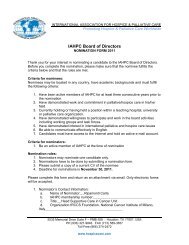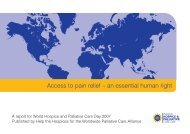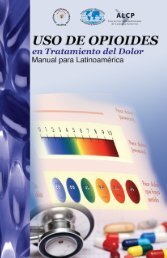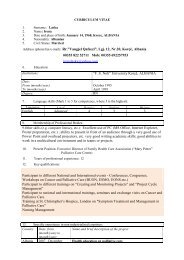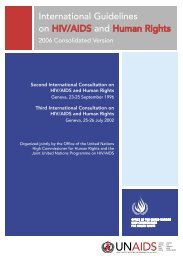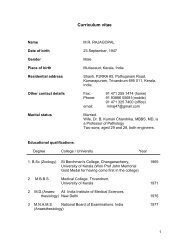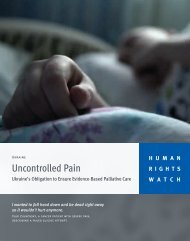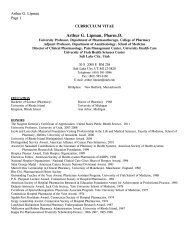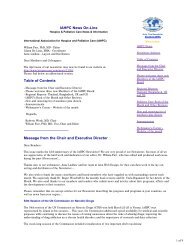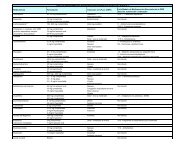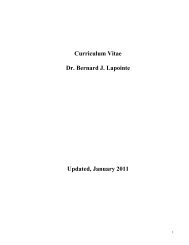INTERIGHTS Bulletin
INTERIGHTS Bulletin
INTERIGHTS Bulletin
You also want an ePaper? Increase the reach of your titles
YUMPU automatically turns print PDFs into web optimized ePapers that Google loves.
170<br />
<strong>INTERIGHTS</strong> <strong>Bulletin</strong><br />
Volume 16 Number 4 2011<br />
distribution of all health resources and<br />
the adoption and implementation of a<br />
national public health strategy and<br />
plan of action addressing the health<br />
concerns of the population. 70<br />
An institution as complex and<br />
important as a health system requires a<br />
range of effective, transparent,<br />
accessible and independent<br />
accountability mechanisms. There are<br />
many options in this regard, including<br />
health commissioners, democratically<br />
elected local health councils, public<br />
hearings, patients’ committees, impact<br />
assessments and judicial proceedings.<br />
The media and civil society<br />
organisations also have a crucial role to<br />
play regarding accountability. Crucially,<br />
the requirement of human rights<br />
accountability extends to both the<br />
public and private health sectors, and<br />
also extends to international actors<br />
working on health-related issues. 71<br />
Conclusion<br />
Violations arising in healthcare<br />
settings continue to have far-reaching<br />
repercussions on victims and their<br />
families. Deaths, denial of emergency<br />
medical care and detention of poor<br />
patients all point to the weak health<br />
institutions across Africa. These<br />
situations also indicate the lack of<br />
accountability processes – a key feature<br />
of health structures across the<br />
continent.<br />
For African states to address these<br />
violations, they need to prioritise<br />
systematic and structural reform of<br />
their health systems. Experts argue<br />
that governments and donor agencies<br />
tend to focus on specific themes, such<br />
as HIV infection, malaria and<br />
tuberculosis, while failing to address<br />
the general state of Africa’s healthcare<br />
systems. Strengthening health services<br />
generally would be very important for<br />
all these programmes. Given that a<br />
country cannot develop without a<br />
minimal health system, what is needed<br />
is long-term investment. However, this<br />
is not being done. 72<br />
While specific violations arising in<br />
healthcare settings need to be<br />
appropriately addressed, an<br />
assessment of a country’s entire health<br />
system, involving looking at the<br />
shortcomings and devising and<br />
implementing solutions, is critical for<br />
fundamental change. Ad hoc<br />
interventions will not permanently<br />
create stronger and more effective<br />
health structures.<br />
A country’s difficult financial situation<br />
does not absolve it from having to take<br />
action to realise the right to health.<br />
When considering implementation of<br />
this right in a particular state, the<br />
availability of resources and the<br />
development context are taken into<br />
account. Nonetheless, no state can<br />
justify a failure to respect its<br />
obligations because of a lack of<br />
resources. States must guarantee the<br />
right to health to the maximum of their<br />
available resources, even if these are<br />
tight. While steps may depend on the<br />
specific context, all states must move<br />
towards meeting their obligations to<br />
respect, protect and fulfil. 73<br />
Accountability mechanisms are<br />
urgently needed for all those actors –<br />
public, private, national and<br />
international – working on healthrelated<br />
issues. The design of<br />
appropriate,<br />
independent<br />
accountability mechanisms demands<br />
creativity and imagination. 74 Creating<br />
these mechanisms or, in countries<br />
where they exist, ensuring that they<br />
adequately respond to violations,<br />
would assure individuals of the<br />
commitment of their governments to<br />
addressing human rights violations in<br />
the health sector.<br />
Judy Oder is a lawyer at <strong>INTERIGHTS</strong>;<br />
she is grateful for the research<br />
assistance provided by Mariam Uberi.<br />
1 Report of the Special Rapporteur on the Right of<br />
Everyone to the Enjoyment of the Highest Attainable<br />
Standard of Physical and Mental Health, Anan Grover:<br />
‘Promotion and protection of all human rights, civil,<br />
political, economic, social and cultural rights, including<br />
the right to development,’ April, 2011, available at<br />
.<br />
2 Ibid, para.65.<br />
3 Ibid, para.105.<br />
4 Ibid, para.106.<br />
5 National: Article 16, African Charter on Human and<br />
Peoples’ Rights CAB/LEG/67/3 rev.5. Regional: Angola:<br />
Article 47, Congo Brazzavile Article 34, Kenya: Article<br />
43, Madagascar: Article 19, Mozambique: Article 89,<br />
South Africa: Article 27.<br />
6 Ibid, Article 2, African Charter.<br />
7 Ibid, Article 5, African Charter.<br />
8 Protocol to the African Charter on Human and<br />
Peoples’ Rights on the Rights of Women in Africa, The<br />
African Charter on the Rights and Welfare of the Child,<br />
AU Convention for the Protection and Assistance of<br />
Internally Displaced Persons in Africa.<br />
9 Covenant on Economic, Social and Cultural Rights,<br />
Convention on the Elimination of Discrimination<br />
against Women, Convention against Torture.<br />
10 FIDA Kenya and Center for Reproductive Rights,<br />
‘Failure to deliver: Violations of women’s rights in<br />
Kenyan health facilities,’ 2007, available at<br />
.<br />
11 ‘A high price to pay: Detention of poor patients in hospitals,’<br />
available at<br />
(accessed 20 November 2011), p.5.<br />
12 Center for Reproductive Rights, ‘Broken promises:<br />
Human rights, accountability and maternal death in<br />
Nigeria,’ available at<br />
<br />
(accessed 24 November 2011).<br />
13 ‘A high price to pay,’ supra, note 11, p.41.<br />
14 International Covenant on Civil and Political Rights,<br />
Article 9, available at<br />
.<br />
15 Ibid, Article 11.<br />
16 Ibid, Article 10.<br />
17 Supra,note 11, A high price to pay, p.71.<br />
18 ‘No Healing Here: Violence, Discrimination and<br />
Barriers to Health for Migrants in South Africa,’ pp.3 &<br />
63, available at<br />
(accessed 24 November 2011).<br />
19 Ibid, p.77.<br />
20 OHCHR & WHO, ‘The Right to Health: Fact Sheet<br />
No.31,’ available at<br />
(accessed 23 November 2011).<br />
21 Vienna Convention on the Law of Treaties 1969,<br />
United Nations, Treaty Series, vol.1155, p.331, entered into<br />
force on January 27, 1980, art.18.<br />
22 South African Constitution Article 27(1)(a) & (3),<br />
available<br />
at<br />
(accessed 1 December<br />
2011).<br />
23 Government of the Republic of South Africa & Ors v<br />
Grootboom & Ors, para.26, quoting The State v<br />
Makwanyane & Anor, para 35, 1995 (3) SA 391 (CC) 1995<br />
(6), BCLR 665 (CC).<br />
24 International Covenant on Economic, Social and<br />
Cultural Rights (ICESCR), adopted December 16 1966,<br />
G.A. Res. 2200A (XXI), 21 U.N. GAOR Supp. (No. 16) at<br />
49, U.N. Doc. A/6316 (1966) 993 U.N.T.S. 3, entered<br />
into force January 3, 1976, art.12.<br />
25 Letter to the Nigerian Senate, ‘No Police Report, No<br />
Treatment,’ available at <br />
(accessed 24 November 2011).<br />
26 A. Obomanu, ‘Pass the Emergency Treatment Bill,’<br />
10 August 2010, available at<br />
<br />
(accessed on 24 November 2011).<br />
27 UN Economic & Social Council, ‘General Comment<br />
14: The right to the highest attainable standard of<br />
health,’ available at



